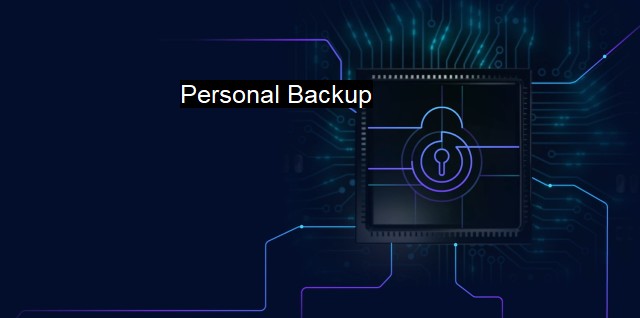What is Personal Backup?
The Benefits of Personal Backup: Ensuring Safe and Secure Data in an Unpredictable Cyber World
"Personal Backup" is a term that implies the secure duplication of data in a cybersecurity and antivirus context. this is a precautionary step to reduce data loss risk due to unforeseen issues such as cyber-attacks, hardware failures, data corruption, or software crashes. Personal back up allows technophiles and common users alike to maintain a secure repository of their invaluable data; preserving their digital history without the worry of permanent data loss. In today's internet-dominated life, both the integrity and security of data are always at stake, rendering personal backup a necessity rather than a luxury.To begin with, personal backup operates on a range of levels including but not limited to system backup, file backup, and personal data backup. System backup is the process of backing up everything on your computer system including system settings, applications, and complete files. In the case of a crash or drive failure, a system backup permits the complete restoration of your computer. File backup, on the other hand, confines itself to backing up all personal files including documents, photos, videos, and essentially all files not included in system files. They are simpler and quicker than system backups as they focus on preserving non-system-critical files.
In a cyber-security context, personal backup can also refer to the safeguarding of personal and enterprise data. This process is ideally multi-faceted, involving encrypted storage protocols and secure locations, which may look like secure cloud storage or dependable physical storage systems.
What makes personal backup paramount in the domain of cybersecurity is the ever-looming risk of data breaches and cyberattacks. Cybersecurity threats have been surging and are increasingly sophisticated- ranging from viruses, trojan horses, and malware to puzzling ransomware - posing a growing threat to unprotected data. In fact, ransomware, a type of malignant software from cryptovirology that impels its victims to pay ransom to access their own data, has proven particularly toxic. These threats heighten the importance of rigorously maintaining a system for backing up data.
In the realm of antivirus software, strong backup strategies can keep valuable data out of harm's way. This is because antivirus software, while helpful, is not impeccable. New viruses develop daily and can sometimes avoid detection from antivirus software.
Given this context, personal backup could and should constitute an integral part of the data safety equation. The principal goal is to ensure that even when the antivirus software fails, or a novel virus bypasses detection, a ready backup source reserves all the vital data.
The function of personal backup extends beyond just cybersecurity. Consider natural disasters such as flooding, fire, earthquakes, or human mistakes like accidental deletions or spilling coffee on your laptop which can yield hardware failures and data loss. Data corruption, for whatever reasons, can lead to lost or inaccessible files. Having a personal backup comes to the rescue these scenarios.
The effectiveness of a personal backup regime is largely determined by two principal factors: the frequency of backup and storage location. It's recommended to perform a backup regularly and store a backup in multiple locations, inclusive of both cloud storage and physical hard drives. Regularly checking and recovering backup data is also crucial.
Personal backup plays a significant role in curbing data loss, giving users a peace of mind and the freedom to venture digitally without constant fear of data breach or loss. It effectively plugs the gaps that contemporary antivirus and cybersecurity measures may leave. The presence of a robust and reliable personal backup system undoubtedly complements cybersecurity and antivirus efforts, fortifying data defence lines further.

Personal Backup FAQs
What is a personal backup?
A personal backup is a copy of all your personal data, such as files, documents, images, and videos, stored in a safe location. This can be done manually by copying the files to an external hard drive, or using automated backup software that saves the data periodically.Why is personal backup important for cybersecurity?
Personal backup is important for cybersecurity because it ensures that your data is protected in case of a cyber attack, such as ransomware or a virus. If your computer is infected, a personal backup will allow you to restore your data to a previous, safe state without paying a ransom or losing all your files.How often should I back up my personal data?
It is recommended to back up your personal data regularly, depending on the frequency and amount of data you generate. For example, if you use your computer heavily for work or store a lot of photos and videos, it is best to back up your data daily or weekly. If you use your computer less frequently, you can back up your data less often.What should I consider when choosing personal backup software?
When choosing personal backup software, you should consider the features it offers, such as automated backups, encryption, and cloud storage options. You should also check if the software is compatible with your operating system and devices. Additionally, you should consider the price, ease of use, and customer support offered by the software.| | A | | | B | | | C | | | D | | | E | | | F | | | G | | | H | | | I | | | J | | | K | | | L | | | M | |
| | N | | | O | | | P | | | Q | | | R | | | S | | | T | | | U | | | V | | | W | | | X | | | Y | | | Z | |
| | 1 | | | 2 | | | 3 | | | 4 | | | 7 | | | 8 | | |||||||